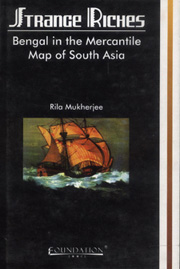Book contents
- Frontmatter
- Contents
- Epigraph
- Preface
- Acknowledgments
- Abbreviations
- Map 1 Places mentioned in Bengal and Arakan: 5th to 13th centuries
- Map 2 Land and sea routes of the Eastern Indian Ocean: 13th to 15th centuries
- 1 Introduction
- 2 Conceptual Formulations
- 3 Key Issues: Bengal
- 4 Introducing Bengal
- 5 The Debated Century
- 6 Networks and States in South Asia
- 7 Unities of Time and Space in Bengal
- 8 Bengal in the Indian Ocean Centred World Economy
- 9 Conclusion
- Bibliography
- Index
2 - Conceptual Formulations
Published online by Cambridge University Press: 26 October 2011
- Frontmatter
- Contents
- Epigraph
- Preface
- Acknowledgments
- Abbreviations
- Map 1 Places mentioned in Bengal and Arakan: 5th to 13th centuries
- Map 2 Land and sea routes of the Eastern Indian Ocean: 13th to 15th centuries
- 1 Introduction
- 2 Conceptual Formulations
- 3 Key Issues: Bengal
- 4 Introducing Bengal
- 5 The Debated Century
- 6 Networks and States in South Asia
- 7 Unities of Time and Space in Bengal
- 8 Bengal in the Indian Ocean Centred World Economy
- 9 Conclusion
- Bibliography
- Index
Summary
The river Ganges is of very unequal breadth, being in some places a League, in others a League and a half wide; so that when the wind is high this River abounds with Waves and Billows, no ways inferior to those of the sea (Glanius, A Relation of An Unfortunate Voyage to the Kingdom of Bengala, 1682, London, Henry Bonwick: 151–2).
States, Religious Networks and Maritime Societies
This book is about Bengal. Bengal is a land of rivers. Its coastal (or littoral) history is marked by centuries old interactions with other lands, peoples and cultures. The history of its coastal commerce and sea trade betrays a continuous negotiation between placid upland rivers coming from the Gangetic plain, swift rivers coming down from the north eastern India, sluggish deltaic zones that house many of Bengal's ports, and the open sea. Such a landscape has rendered Bengal's littoral space unique. The discovery of pre-historic stone figures from eastern India–mainly of snakes, monitor lizards, ducks, birds, toads and frogs–affirm the existence of this distinctive zone from very early times. No work on the commercial history of Bengal can afford to ignore this distinctive waterscape.
Sailing in Bengal is a combination of riverine (upcountry), coastal and sea navigation. Sailing is an integral part of this landscape. Ballads have been composed around boats, poems and novellas have been written about ships at sea, and customs, rituals and festivities have grown around sailing practices and passed into the stuff of legend. Sailing practices have complemented three types of trade: riverine, coastal and long distance.
- Type
- Chapter
- Information
- Strange RichesBengal in the Mercantile Map of South Asia, pp. 21 - 55Publisher: Foundation BooksPrint publication year: 2006



